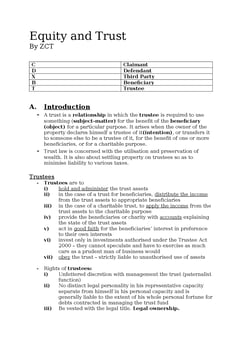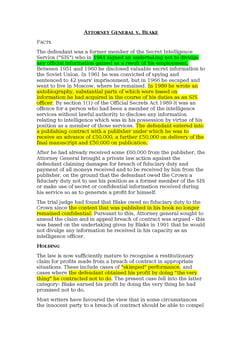Judgement for the case Re Oatway
Table Of Contents
KEY POINTS
Trustees and their potential breaches of trust form a fundamental component of trust law. This aspect becomes especially critical when dealing with trust funds held in banking accounts, mingled with other funds, invested, or when payments are appropriated.
FACTS
This case involves the estate of Lewis John Oatway, an insolvent solicitor who passed away in 1902. Christiana Mary Oatway, the sole executrix of the estate, was the defendant. The dispute centered on the ownership of £2,474 19s., representing the proceeds from the sale of 1,000 shares in the Oceana Company, registered in the deceased's name.
Oatway and Maxwell Skipper were co-trustees under Charles Skipper's will. In breach of trust, £3,000 was advanced from Charles Skipper's estate to Maxwell Skipper, secured by a mortgage on certain real estate. Acting as Maxwell Skipper's attorney, Oatway sold Maxwell's reversionary interest for £7,000, depositing it into his bank account. Despite a credit balance of £771 13s. 4d., he failed to repay the £3,000 from Charles Skipper's trust estate.
By August 15, 1901, Maxwell Skipper owed Oatway £1,779 7s. 1d., plus additional unascertained costs. On August 24, 1901, Oatway purchased Oceana shares for £2,137 12s. 3d from his account, which had a balance of £6,635 6s. 4d after deposits and withdrawals, including the £3,000 trust money.
Oatway later depleted his account for personal purposes, leaving only the Oceana shares. Maxwell Skipper sought to recover £2,474 19s. from the shares through a summons, either in his capacity or as a trustee under Charles Skipper's will.
JUDGEMENT
The court, having considered the circumstances, concluded that the proceeds from the Oceana shares belonged to the trust funds under the will, for which Oatway and Maxwell Skipper had been trustees.
Oatway's investment in the shares could not absolve him of the trust's claim or charge on the money invested as long as the trust funds initially placed into the account had not been appropriately restored and reinvested in the names of the rightful trustees.
Therefore, the Oceana shares' proceeds were deemed part of the trust funds under Charles Skipper's will.
COMMENTARY
Trust law is crucial for regulating trustees and addressing breaches of trust, particularly in cases involving mixed trust funds and misappropriation. In this case, the estate of Lewis John Oatway, an insolvent solicitor who died in 1902, was the subject of a legal dispute. Christiana Mary Oatway, the estate's sole executrix, was at the center of the controversy regarding the ownership of £2,474 19s. This sum represented the proceeds from the sale of 1,000 shares in the Oceana Company, registered under the deceased's name.
Oatway and Maxwell Skipper were co-trustees under Charles Skipper's will. In a breach of trust, £3,000 was advanced from Charles Skipper's estate to Maxwell Skipper, secured by a mortgage on specific real estate. Acting as Maxwell Skipper's attorney, Oatway facilitated the sale of Maxwell's reversionary interest for £7,000, depositing the funds into his personal bank account, which had a balance of £771 13s. 4d. However, he failed to repay the £3,000 from Charles Skipper's trust estate.
By August 15, 1901, Maxwell Skipper owed Oatway £1,779 7s. 1d, along with unascertained costs. On August 24, 1901, Oatway purchased 1,000 shares in the Oceana Company for £2,137 12s. 3d, using funds from his account, retained a balance of £6,635 6s. 4d after various deposits and withdrawals, including the £3,000 trust money.
Oatway later depleted the account for personal purposes, leaving only the Oceana shares. In response, Maxwell Skipper sought to recover £2,474 19s. from the shares, either personally or as a trustee under Charles Skipper's will.
The court determined that the proceeds from the Oceana shares rightfully belonged to the trust funds under Charles Skipper's will, where Oatway and Maxwell Skipper had acted as trustees. Oatway's investment in the shares did not exempt him from the trust's claim on the invested money as long as the initial trust funds had not been properly restored and reinvested in the names of the rightful trustees. Consequently, the proceeds from the Oceana shares were considered part of the trust funds under Charles Skipper's will.
ORIGINAL ANALYSIS
The testator and M were co-trustees under a will. Trust monies were later paid into the testator’s own bank account which contained some of his own money. He used some money from the account first to purchase shares and subsequently dissipated the rest of the monies in the account. The testator died insolvent and the shares were subsequently sold.
The question arose as to whether the beneficiaries were entitled to trace into the proceeds of the sale of shares.
-
The court held that it was, saying that the rule in Re Hallett’s Estate is subject to the principle that until all the trust monies are restored, the beneficiary has a first charge over all the assets purchased with money from the bank account.
A straightforward application of Re Hallett’s would have meant that T’s own money was used to buy the shares and the beneficiary’s money was dissipated.
Joyce J
It is a well-established principle that “whatever alteration of form any property may undergo, the true owner is entitled to seize it in its new shape if he can prove the identity of the original material”.
However where:
The quality of the articles that are mixed be uniform, and the original quantities known, as in the case of so many pounds of trust money mixed with so many pounds of the trustee's own money, the person by whose act the confusion took place is still entitled to claim his proper quantity, but subject to the quantity of the other proprietor being first made good out of the whole mass.
-
Hence if a fiduciary holds Plaintiff’s money in his account, puts his own money in and then withdraws some, he can’t later say that following Re Hallett’s Estate it is his [the fiduciary’s] money which is left.
I.e. where the trustee mixes trust property with his own already in the account and then spends some on property and squanders the rest, Hallett’s doesn’t apply - the beneficiary has a charge over the mixed fund.
RELATED CASES
For Further Study on Re Oatway

Equity notes fully updated for recent exams at Oxford and Cambridge. Th...
Need instant answers? Our AI exam tutor is here to help.
Ask questions 🙋 Get answers 📔 It's simple 👁️👄👁️
Our AI is educated by the highest scoring students across all subjects and schools. Join hundreds of your peers today.
Get StartedSimilar Cases
Related Product Samples
These product samples contain the same concepts we cover in this case.

 Since 2010, Oxbridge Notes has been a trusted education marketplace, supplying high-quality materials from top achievers at universities like Oxford, Cambridge, LSE, Harvard, and Yale.
Since 2010, Oxbridge Notes has been a trusted education marketplace, supplying high-quality materials from top achievers at universities like Oxford, Cambridge, LSE, Harvard, and Yale.